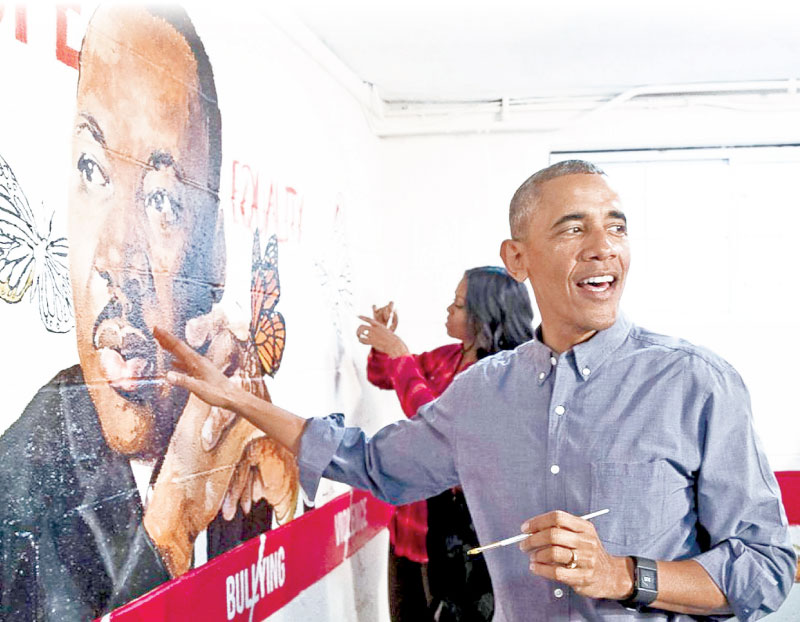US: One year after exchanging pleasantries with a newly-inaugurated President Donald Trump and ascending onto Marine One for the final time, former President Barack Obama has remained a central figure across the United States and global political scene. As his successor has seemed to systematically target key components of his legacy, Obama has been strategic, according to current and former aides, in choosing when and how to speak out.
He’s watched the year's political developments closely from Chicago and his home in Washington D.C., which sits just miles up the road from the White House. He’s made global excursions to mentor young adults, delivered paid and unpaid speeches and hunkered down to write his post-presidency book, while coordinating the operations of his foundation and presidential library. The Obama’s have spent much time in Chicago where the foundation is located, spending time nurturing young politicians and teaching the importance of civic engagement.
“He has rolled up his sleeves and really worked hard to make sure [the foundation] reflects his values and his priorities,” former White House senior adviser Valerie Jarrett told ABC News. “Civic engagement he thinks its so incredibly important for young people to recognize their responsibilities as citizens and that that should begin at a young age because it should be a lifelong passion and so anything he can do to mobilize that effort is important.”
Despite watching his signature achievements unravel, Obama has been described as “upbeat” and “optimistic.” But that positivity doesn’t come without some anxiety.
“Of course it causes anxiety just like it does for so many people,” former White House senior adviser Valerie Jarrett told ABC News. “He’s never looked at it from the perspective of him — his legacy — he’s looked at it from the perspective of the people whose lives he tried to improve. So if he thinks that people will lose healthcare or that young DACA folks will be at risk and potentially lose their status, sure that’s extraordinarily and profoundly troubling to him.” Just two days before the transfer of power was carried out on the steps of the US Capitol, Obama outlined to reporters in his final news conference the actions a Trump administration could take that might spur him to break with the precedent of polite silence previous presidents typically extended to their successors. “There’s a difference between that normal functioning of politics and certain issues or certain moments where I think our core values may be at stake,” Obama said. In a year’s span, President Obama spoke out four separate times with vocal objection to a policy being pursued by President Trump and the GOP-led Congress, including twice regarding the Republicans’ failed effort to repeal and replace the Affordable Care Act, President Trump’s announcement of U.S. withdrawal from the Paris Climate Agreement and the administration’s rescission of legal protections for nearly 800,000 ‘DREAMers.’
But Obama was notably restrained in going after Trump directly regarding several other highly controversial moments in his first year, including the botched rollout of his first travel ban, his response to the white supremacist violence in Charlottesville and his accusation that Obama illegally wiretapped him during the election.
“I think you saw him kind of do that deftly and strategically this past year,” one aide said. “When it comes especially to the president’s political involvement but certainly all of this other stuff, he’s keenly aware that there’s nothing more that President Trump would like than to make Obama his foil.”
Matthew Dallek, a political historian and associate professor at George Washington University’s Graduate School of Political Management, pointed out that Obama wasn’t necessarily alone in breaking with the quiet deference that presidential successors typically extend to the acting president. In October, former President George W. Bush delivered a rare public speech in New York City in which he didn’t call Trump out by name, but seemed to make multiple references to his effect on American political discourse. “Bigotry seems emboldened. Our politics seems more vulnerable to conspiracy theories and outright fabrication,” Bush said. “We’ve seen nationalism distorted into nativism.” “What he said then may have been harsher than anything he said about Barack Obama during the eight years of his presidency,” Dallek said. “I think it’s a bit unusual but I think the sense is among not just Barack Obama that it is incumbent upon them to speak out against Trump when they think it’s appropriate.” Notably, Trump and Obama have not spoken since Inauguration Day, a sharp contrast from past presidents who have at times seeked counsel from their predecessors. - ABC NEWS



Add new comment